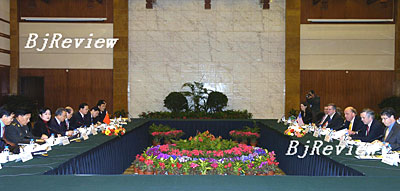|

The recently concluded fifth round of the China-U.S. Strategic Dialogue with its special focus on defense was an instrumental first step for the two countries to advance their military relations through formal discussions, Chinese international affairs experts said.
For the first time since the mechanism, which Washington prefers to call Senior Dialogue, was launched in 2005, military officials were involved in the discussions.
Officials from China and United States, headed by Chinese Vice Foreign Minister Dai Bingguo and U.S. Deputy Secretary of State John Negroponte, held talks in Guiyang, the capital of southwest China's Guizhou Province, on January 17-18. During the two-day dialogue, they "exchanged in-depth views in a candid manner" on topics such as the international situation, China-U.S. relations and the two countries' cooperation in international and regional issues, according to a news release issued by China's Foreign Ministry.
Among the participants were Ding Jingong, deputy head of the Foreign Affairs Office at China's Ministry of National Defense, and James Shinn, U.S. Assistant Secretary of Defense for Asian and Pacific security affairs.
The inclusion of discussions in the military field marked fresh progress in the China-U.S. Strategic Dialogue, said Luo Yuan, Deputy Director of the World Military Research Department of the Academy of Military Sciences of the People's Liberation Army.
"Political talks inevitably involve defense and security topics, such as national sovereignty and territory and the prevention of crises, which are all related to the military," he said. "Military officials' participation in the dialogue is highly significant."
While hailing the growing military exchanges between China and United States, experts underlined the need for the countries to address each other's concerns equally. Strategic mutual trust is of paramount importance to both countries, they said.
During the talks, China and the United States agreed to continue to implement the consensus reached by the two countries' heads of state, maintain high-level exchanges and deepen dialogue and cooperation. They also agreed to strengthen their coordination in international affairs and to properly handle sensitive issues to achieve the stable development of China-U.S. relations.
Luo pointed out that China and the United States have established a number of defense dialogue mechanisms, such as the vice-ministerial level defense consultation and the maritime safety consultation, between their ministries of defense. Some of mutual visits also have become institutionalized, he said.
"Dialogue mechanisms established through various channels and on different levels demonstrate China's eagerness to integrate into the international system and the Chinese military's confidence and sincerity in safeguarding peace and strengthening mutual trust," Luo said.
The increasing military exchanges between China and the United States are based on their mutual needs, said Jin Canrong, Deputy Dean of the School of International Studies at Renmin University of China. As major military powers, both countries badly need to explore ways to reduce potential frictions, he said. Dialogue mechanisms and high-level visits are useful in this regard, he said, adding that cooperation between the two countries' military forces in carrying out joint exercises is still in a primary stage.
The Chinese and U.S. navies held their first joint maritime search and rescue exercise in 2006. In late 2007, the two countries agreed to set up a hotline between their ministries of defense. Commander-in-Chief of the U.S. Pacific Command Timothy Keating concluded his second visit to China in eight months on January 16.
Exchanges like these have helped increase the two countries' military transparency and enhance their mutual trust, Luo said. While China has made incremental progress in promoting military transparency, such transparency should be mutual and equal, he said. Given its own security concerns, China has reason to ask the United States to be more transparent, he added.
Months after the fourth round of the China-U.S. Strategic Dialogue in Washington last June, the United States said it would sell sophisticated weapons, including 12 antisubmarine aircraft and 144 cruise missiles, to Taiwan. The move naturally raised China's doubts about the strategic purpose of the United States, Luo said.
At the Guiyang meeting, Dai reaffirmed China's position on the Taiwan question. He emphasized its strong opposition to the Taiwan authorities' secessionist activities aimed at creating "Taiwan independence." Safeguarding peace and stability across the Taiwan Straits is of great significance to the overall development of China-U.S. relations, Dai said. The United States understands the sensitive nature of the Taiwan question and China's concern in this regard, Negroponte said at the meeting. It adheres to the one-China policy and opposes "Taiwan independence" activities, including the "UN membership referendum," he said. The United States would continue to follow the situation and remain vigilant, he added.
Learning about each other's security concerns and dispelling suspicions to enhance mutual understanding are important goals of the China-U.S. Strategic Dialogue, Luo said. At the Guiyang meeting, China made it clear to the United States that the Taiwan question bears on its core strategic interests. The United States realized that the sensitive question should be handled appropriately. In this sense, the goals of the strategic dialogue were fulfilled, Luo said.
The Taiwan question is at the top of China's list of concerns, Jin said. The United States has its own list that includes the North Korean nuclear issue, the Iranian nuclear issue, the Darfur conflict in Sudan and the situation in Myanmar. It also expects China to contribute to addressing the energy issue and climate change, Jin said.
China is a cooperative country and will engage itself in international cooperation to the greatest extent possible, Jin said. Although it is difficult to tell if any substantial progress was made on these issues during the dialogue, it is highly probable that the two countries may have agreed on some common principles, he said. | 